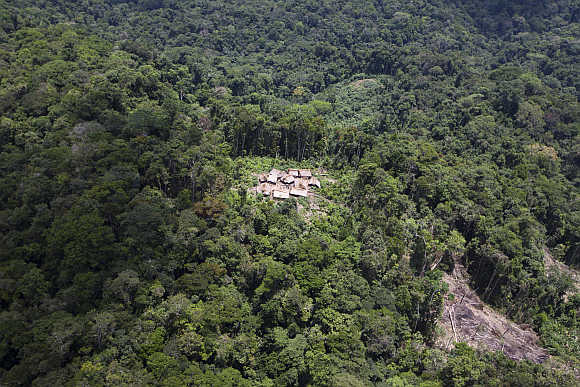 | « Back to article | Print this article |
Two laws, two ministries, one continuing confusion
Trouble is again being caused by the inherent contradictions between the two laws - the Indian Forest Act and the Forest Rights Act - that govern India's forests, their produce and the people dependent on them for their livelihood.
The fact that these statutes are implemented by different ministries - the environment ministry for the forest law and the tribal affairs ministry for the FRA - exacerbates the problem.
The latest manifestation of this conflict has emerged from the missive despatched by Tribal Affairs Minister Kishore Chandra Deo to his environment ministry counterpart, Jayanthi Natarajan, accusing the latter of handing over forests to industry without seeking consent from the local Gram Sabhas, which is mandatory under the FRA.
Click NEXT to read more...
Two laws, two ministries, one continuing confusion
Another revealing discrepancy between the two laws that has come to light recently concerns the collection and movement of minor forest produce by forest-dwelling communities. The forest law vests overall control over the productive assets of the jungles in the forest bureaucracy, allowing only head loads of non-timber resources to be gathered and taken out by members of local communities.
Violators can be punished. The FRA, on the other hand, provides the locals free access to minor forest produce, including the right to transport it out of the forests. In other words, what has been granted by one law as a right to the indigenous people can be treated as a punishable offence under the other law.
Click NEXT to read more...
Two laws, two ministries, one continuing confusion
True, some inconsistencies between the two edicts have been addressed by altering the guidelines for their implementation, but ambiguities still exist. Bamboo, one of the most valuable forest produce, is a case in point. While bamboo has been listed under the FRA as a minor (non-timber) forest produce freely accessible to local communities, the original forest law continues to classify it as "timber", giving forest officials control over its harvesting and movement.
Moreover, the right granted to people under the FRA to occupy, cultivate and graze animals on the forest land traditionally inhabited by them or their ancestors is being frowned upon not only by forest departments but also by environmentalists and wildlife activists.
Click NEXT to read more...
Two laws, two ministries, one continuing confusion
On the one hand, it is true India's forests are its national heritage and cannot be allowed to dwind#8804 on the other hand, forest officials are unwilling to give up hegemony over these areas. Apart from this, there seems to be some incongruity even within the FRA that allows myriad interpretations of its provisions.
While some of its sections make this law override other existing laws, especially where the rights of the tribals are concerned, another section maintains that the FRA shall be in addition to, and not in derogation of, any other law in force.
Click NEXT to read more...
Two laws, two ministries, one continuing confusion
This ambiguity, evidently, needs to be removed. In the broader sense, perhaps the two laws need to be revisited and suitably amended to align them with each other. The best option is to synthesise the two pieces of legislation and bring their implementation under one ministry, to avoid varying interpretations and inter-ministerial conflict.
Both conservation of forests and tribal welfare are critical, considering that the tribal-dominated forests are where the Naxalites abound.





